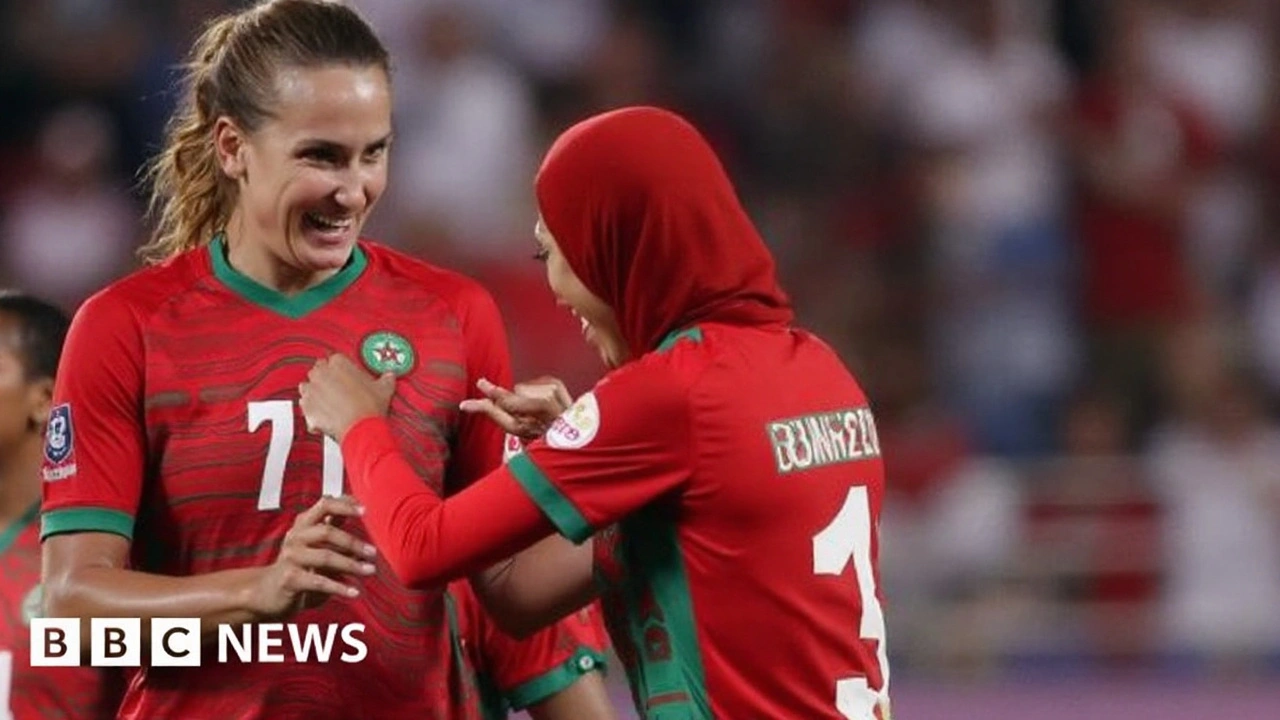Mrabet holds her nerve as Morocco top the group
A single, ice-cool penalty decided a tense night in Rabat. Yasmin Mrabet drilled her spot kick high into the top corner in first-half stoppage time to give Morocco a 1-0 win over Senegal and a ticket to the Women’s Africa Cup of Nations quarter-finals. The Atlas Lionesses finished the group on seven points, while Senegal’s campaign ended at three.
The game had the feel of knockout football long before the final whistle. Morocco seized the early rhythm, moving the ball quickly into wide areas and stitching neat passing patterns through midfield. That pressure finally told on the stroke of halftime when Ibtissam Jraïdi burst into the box and collided with goalkeeper Adji Ndiaye. After a VAR check, the referee pointed to the spot and booked the keeper.
Mrabet didn’t flinch. Her strike had power and height, the kind that gives a goalkeeper no chance if it’s on target. The stadium erupted, and Morocco carried a slender lead into the break—precious in a match this tight, where one moment of composure can swing a group.
Senegal came out with a different edge. They pushed the back line higher, hunted second balls, and sent early service toward Nguenar Ndiaye and Korka Fall. Crosses fizzed across the six-yard box. Several times it felt like a touch away from parity, but Morocco’s defensive unit refused to panic.
Khadija Er-Rmichi was decisive and clean with her handling, cutting out danger before it turned into chaos. In front of her, Zineb Redouani and Nouhaila Benzina read the angles well—showing opponents wide, blocking at the last second, and clearing when subtlety wasn’t the answer. It wasn’t pretty football in the final stretch, but it was the kind of disciplined defending that wins tournament matches.
Head coach Reynald Pedros made smart, timely tweaks to steady the ship. Morocco sat a touch deeper without abandoning their intent to counter. The midfield line tightened, pressing only when the trap was set. Fresh legs arrived from the bench to close space on the flanks and chase lost causes. Each change shaved a little more time off the clock and kept Senegal at arm’s length.
The result mirrors Morocco’s broader group form: confident, efficient, and resilient. They scored six across their first two fixtures and now added game management to their toolkit with a clean sheet in a pressure moment. The balance between their aggressive wing play and sturdy defensive work is exactly what you need when margins shrink.
For Senegal, the frustration is real. Their second half had energy and intent, but the final ball didn’t match the build-up. When they did get sights of goal, Er-Rmichi or a last-ditch block shut the door. Three points from three games leaves them short, but their resilience after halftime showed a platform to build on—especially in transitions and set-piece pressure.
The key flashpoint—the penalty—will be debated, as these moments always are. Goalkeepers rushing out in one-on-ones walk a tightrope; if contact comes and the attacker is favored to reach the ball, VAR often backs the on-field call. Ndiaye’s yellow card reflected that balance: reckless enough for punishment, not high enough for red, and decisive for the match.
What changes now? Knockout football strips away safety nets. Morocco’s path gets tougher, and the margin for error disappears. But a packed, loud crowd in Rabat—and nationwide momentum—can tilt tense matches. Pedros will like the variety in his side: width and speed when chasing a lead, compact lines and quick counters when protecting one, and a set-piece taker who can handle pressure.
Individuals made statements too. Mrabet’s composure from 12 yards capped a smart midfield performance. Redouani and Benzina showed leadership without the ball. Er-Rmichi organized everything in front of her and made the saves that matter. And Jraïdi’s willingness to run at defenders forced the decisive mistake—small moments that decide tournaments.
There were hints of a blueprint for the quarters. Expect Morocco to press in bursts rather than constantly, to use their wide players for territory, and to target early set pieces. Expect them to stay calm when opponents throw numbers forward late. And expect opponents to test them with aerial duels and quick diagonals, just as Senegal did.
On a night stacked with stakes, the home side handled the swing points better. One VAR decision, one nerveless penalty, one stretch of gritty defending—that’s the difference in a group finale. The next chapter is the knockout stage, where moments like these come thicker and faster. For now, the scoreboard reads what the crowd in Rabat wanted to see: Morocco through, Senegal out, and the Atlas Lionesses looking dangerous.
Key moments and takeaways
- Morocco vs Senegal turned on a stoppage-time penalty: Ibtissam Jraïdi drew the foul; Yasmin Mrabet converted high into the net.
- VAR confirmed the decision; Senegal goalkeeper Adji Ndiaye was booked.
- Senegal’s best spell came after halftime, with Nguenar Ndiaye and Korka Fall driving the push for an equalizer.
- Morocco’s defensive spine—Er-Rmichi, Redouani, Benzina—saw out waves of pressure with blocks, claims, and clearances.
- Coach Reynald Pedros tightened midfield lines and used the bench to control tempo and territory late on.
- Morocco top the group on seven points and head into the quarter-finals with momentum and a clean sheet.







Subhash Choudhary
August 27, 2025 AT 17:33 PMMorocco kept their cool after that early penalty and it showed in the way they managed the second half. The Atlas Lionesses stuck to their game plan, using quick passes down the flanks to stretch Senegal’s defense. Their defensive line stayed compact, and the keeper’s timing on the box crosses was spot on. Pedros’ tweaks on the bench gave them fresh legs that kept the pressure in check. Overall, a disciplined performance that deserved the win.
Ethan Smith
September 1, 2025 AT 08:40 AMThe penalty conversion by Mrabet was executed with textbook composure. A well‑timed run from Jraïdi forced the keeper’s error, and VAR’s confirmation left no doubt. Morocco’s midfield controlled possession, allowing them to dictate tempo. Defensively, Er‑Rmichi and her backline displayed organized clearances at crucial moments. Such efficiency is exactly what is needed to progress in knockout stages.
Evelyn Monroig
September 5, 2025 AT 23:47 PMThe narrative sold to fans about a clean penalty hides a deeper manipulation of the officiating system.
Every time a VAR decision swings in favor of the host nation, a pattern emerges that cannot be dismissed as coincidence.
In Rabat, the camera angles were conveniently positioned to obscure the goalkeeper’s advance on Jraïdi.
The referee’s hesitation to give a straight red, opting instead for a yellow, fits a familiar script of protecting the home side.
Statistically, the host teams in recent WAFCON editions have benefited from a higher-than-average number of penalty awards.
It is not merely luck; it is a coordinated effort between officials and organizers to keep the crowd satisfied.
The crowd’s roar after the penalty creates a feedback loop that pressures dissenting voices into silence.
Meanwhile, Senegal’s legitimate attacks were met with harsh fouls that went unpunished, further tilting the balance.
One could argue that the integrity of the competition is compromised when such bias becomes systematic.
Fans on social media have already started noting the irregularities, but the algorithmic echo chambers mute dissent.
Even the commentary team hinted at “a controversial moment” without naming the underlying issue.
This silence is a hallmark of a controlled narrative designed to maintain a specific image of fairness.
When the same referee appears in later stages, the same patterns repeat, reinforcing the perception of impartiality.
It is essential for the governing bodies to audit these decisions transparently to restore trust.
Otherwise, the sport risks alienating passionate supporters who demand genuine competition.
Until such reforms happen, we will continue to see the subtle yet pervasive influence of power shaping outcomes.
Gerald Hornsby
September 10, 2025 AT 14:53 PMWhat a nail‑biter, and Mrabet’s calm was poetry in motion 😎.
Hina Tiwari
September 15, 2025 AT 06:00 AMI feel for Senegal, they gave it their all but got unlucky at the end. The miss‑call on the penalty will stick with them for a while. Hopefully they bounc back stronger in the next round of fixtures. Football is cruel but also beautiful when teams fight like this.